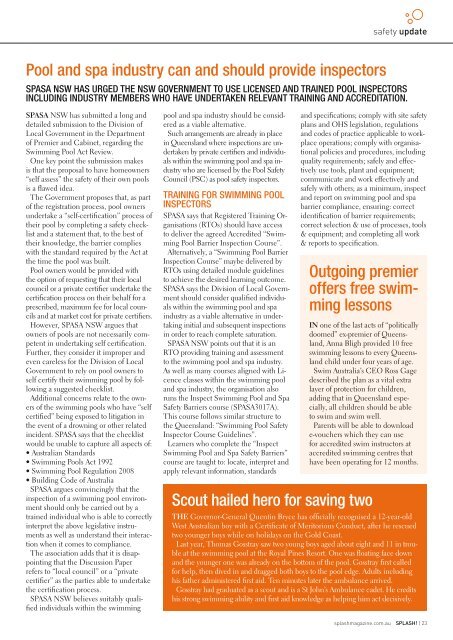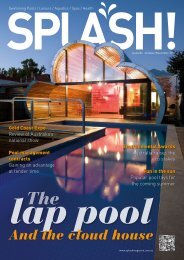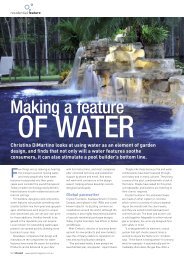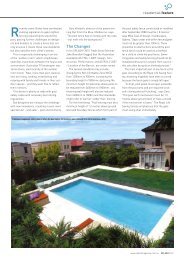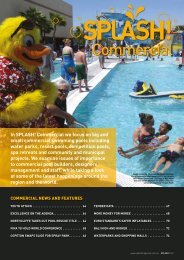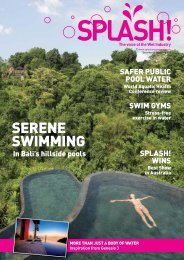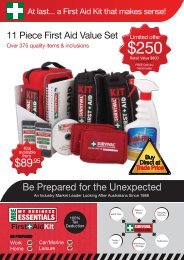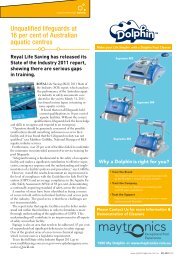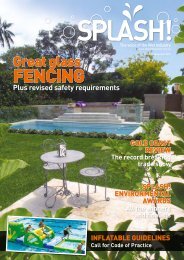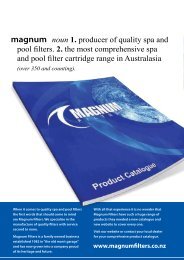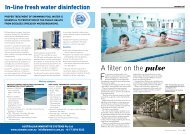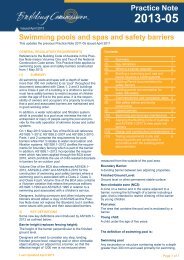SPLASH_81_p1_30 - Splash Magazine
SPLASH_81_p1_30 - Splash Magazine
SPLASH_81_p1_30 - Splash Magazine
You also want an ePaper? Increase the reach of your titles
YUMPU automatically turns print PDFs into web optimized ePapers that Google loves.
safety updatePool and spa industry can and should provide inspectorsSPASA NSW HAS URGED THE NSW GOVERNMENT TO USE LICENSED AND TRAINED POOL INSPECTORSINCLUDING INDUSTRY MEMBERS WHO HAVE UNDERTAKEN RELEVANT TRAINING AND ACCREDITATION.SPASA NSW has submitted a long anddetailed submission to the Division ofLocal Government in the Departmentof Premier and Cabinet, regarding theSwimming Pool Act Review.One key point the submission makesis that the proposal to have homeowners“self assess” the safety of their own poolsis a flawed idea.The Government proposes that, as partof the registration process, pool ownersundertake a “self-certification” process oftheir pool by completing a safety checklistand a statement that, to the best oftheir knowledge, the barrier complieswith the standard required by the Act atthe time the pool was built.Pool owners would be provided withthe option of requesting that their localcouncil or a private certifier undertake thecertification process on their behalf for aprescribed, maximum fee for local councilsand at market cost for private certifiers.However, SPASA NSW argues thatowners of pools are not necessarily competentin undertaking self certification.Further, they consider it improper andeven careless for the Division of LocalGovernment to rely on pool owners toself certify their swimming pool by followinga suggested checklist.Additional concerns relate to the ownersof the swimming pools who have “selfcertified” being exposed to litigation inthe event of a drowning or other relatedincident. SPASA says that the checklistwould be unable to capture all aspects of:• Australian Standards• Swimming Pools Act 1992• Swimming Pool Regulation 2008• Building Code of AustraliaSPASA argues convincingly that theinspection of a swimming pool environmentshould only be carried out by atrained individual who is able to correctlyinterpret the above legislative instrumentsas well as understand their interactionwhen it comes to compliance.The association adds that it is disappointingthat the Discussion Paperrefers to “local council” or a “privatecertifier” as the parties able to undertakethe certification process.SPASA NSW believes suitably qualifiedindividuals within the swimmingpool and spa industry should be consideredas a viable alternative.Such arrangements are already in placein Queensland where inspections are undertakenby private certifiers and individualswithin the swimming pool and spa industrywho are licensed by the Pool SafetyCouncil (PSC) as pool safety inspectors.TRAINING FOR SWIMMING POOLINSPECTORSSPASA says that Registered Training Organisations(RTOs) should have accessto deliver the agreed Accredited “SwimmingPool Barrier Inspection Course”.Alternatively, a “Swimming Pool BarrierInspection Course” maybe delivered byRTOs using detailed module guidelinesto achieve the desired learning outcome.SPASA says the Division of Local Governmentshould consider qualified individualswithin the swimming pool and spaindustry as a viable alternative in undertakinginitial and subsequent inspectionsin order to reach complete saturation.SPASA NSW points out that it is anRTO providing training and assessmentto the swimming pool and spa industry.As well as many courses aligned with Licenceclasses within the swimming pooland spa industry, the organisation alsoruns the Inspect Swimming Pool and SpaSafety Barriers course (SPASA<strong>30</strong>17A).This course follows similar structure tothe Queensland: “Swimming Pool SafetyInspector Course Guidelines”.Learners who complete the “InspectSwimming Pool and Spa Safety Barriers”course are taught to: locate, interpret andapply relevant information, standardsand specifications; comply with site safetyplans and OHS legislation, regulationsand codes of practice applicable to workplaceoperations; comply with organisationalpolicies and procedures, includingquality requirements; safely and effectivelyuse tools, plant and equipment;communicate and work effectively andsafely with others; as a minimum, inspectand report on swimming pool and spabarrier compliance, ensuring: correctidentification of barrier requirements;correct selection & use of processes, tools& equipment; and completing all work& reports to specification.Outgoing premieroffers free swimminglessonsIN one of the last acts of “politicallydoomed” ex-premier of Queensland,Anna Bligh provided 10 freeswimming lessons to every Queenslandchild under four years of age.Swim Australia’s CEO Ross Gagedescribed the plan as a vital extralayer of protection for children,adding that in Queensland especially,all children should be ableto swim and swim well.Parents will be able to downloade-vouchers which they can usefor accredited swim instructors ataccredited swimming centres thathave been operating for 12 months.Scout hailed hero for saving twoTHE Governor-General Quentin Bryce has officially recognised a 12-year-oldWest Australian boy with a Certificate of Meritorious Conduct, after he rescuedtwo younger boys while on holidays on the Gold Coast.Last year, Thomas Gosstray saw two young boys aged about eight and 11 in troubleat the swimming pool at the Royal Pines Resort. One was floating face downand the younger one was already on the bottom of the pool. Gosstray first calledfor help, then dived in and dragged both boys to the pool edge. Adults includinghis father administered first aid. Ten minutes later the ambulance arrived.Gosstray had graduated as a scout and is a St John’s Ambulance cadet. He creditshis strong swimming ability and first aid knowledge as helping him act decisively.splashmagazine.com.au <strong>SPLASH</strong>! | 23


